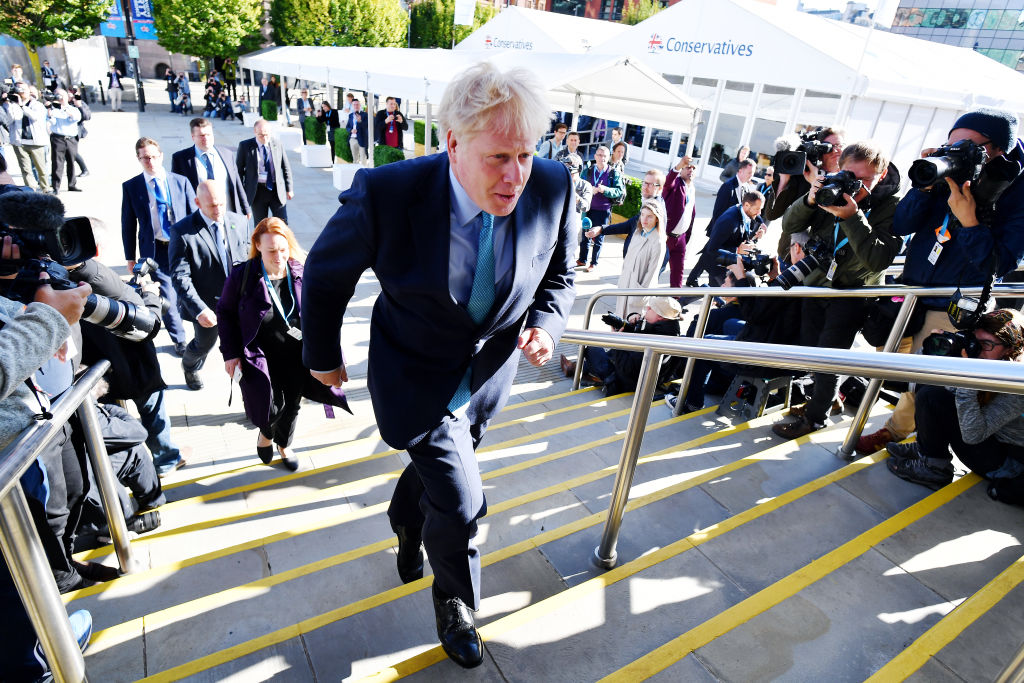Why do so many people try to compare Boris Johnson with Donald Trump? There is a US president whose manner and approach our prime minister resembles, but it isn’t Trump – it is Bill Clinton. It is hard to think of anyone else who has honed to a fine art the ability to survive narrow scrapes with native charm.
Just look at the reaction to the allegation that Boris groped a young female journalist, Charlotte Edwardes, beneath The Spectator’s dining table two decades ago
Yes, Donald Trump survived groping allegations too, but not without stirring up a hornets’ nest of outrage, culminating in a mass protest following his inauguration. Trump survives by escalating outrage against him, thus uniting his enemies’ enemies behind him.
Boris, like Clinton, gets through with bluster and deflection, by subduing the outrage. I am not sure how many people believe his denial, but the efforts of his opponents to bring it up at every opportunity seem to get no traction whatsoever.
If you think what has happened this week, and compare it with what else has happened since the #MeToo movement emerged, it is extraordinary. Two years ago, then deputy prime minister Damian Green was accused of similarly touching a female journalist’s leg – an act he, too, denied. The whole thing seemed to escalate rapidly, resulting in an investigation, further revelations about porn found on his office computer, and his resignation. The then-defense secretary Michael Fallon hardly lasted a couple of days when he was accused of making a crude remark to Andrea Leadsom before a cabinet meeting. Yet Boris survives, yet again, almost unscathed. How?
As with Bill Clinton, there are three reasons for Boris’ ability to shake off scandals and allegations which would quickly fell other politicians.
Firstly, there is his native wit and charm. Although this is diminishing in Boris’ case, it is still a powerful weapon. People find it much harder to think ill of people who make them smile, who exude a sense of wellbeing.
Secondly, like Clinton, Boris has built up an expectation of his behavior which serves to protect him now he is in the top job. We know he has affairs, we know we can’t trust everything he says, but it is built into his share price. We have given up caring.
But thirdly is perhaps the biggest secret of all behind Boris’s ability to survive scandals – and alleged scandals. There are simply too many of them for his enemies to focus properly on any one of them.
A week ago, came the allegations about the grants given to US businesswoman Jennifer Arcuri when Boris was mayor of London. Then, just as that seemed to be gaining traction, he was being accused of encouraging violence by using immoderate language in the Commons (a rather feeble ‘scandal’ given that he had merely used the word ‘surrender’ – a word used by TUC general secretary Frances O’Grady about Boris two weeks earlier with absolutely no-one accusing her of violent language). But that, too, was soon blown away by the claims by Charlotte Edwardes. It is hard to keep up – with the result he wriggles away every time.
Bill Clinton was the same. While he was president, Republicans endlessly tried to dig up dirt on him, about business deals, affairs and so on. But all they achieved was to create background noise. It took a great big fib about not having sexual relations with a young intern to finally bring about impeachment – at which point he resorted to native charm and survived with little damage to his public reputation. He would have won again in 2000 had he been allowed to stand.
The fast-growing profession of reputation-management will be studying Boris for years to come. The lesson? That if you have skeletons in your cupboard, make sure there are plenty of them to rattle around – so that it becomes hard for any of them to stand out.
This article was originally published onThe Spectator’s UK website.






















